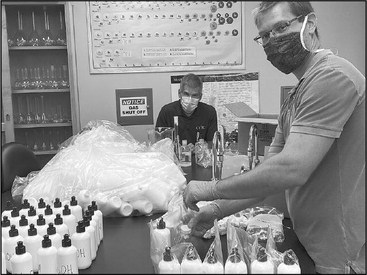Not business as usual as CVTC reopens for fall semester classes


Chippewa Valley Technical College’s science instructors gathered recently to assemble lab kits for students to take home and use when the new academic year opened on Monday, Aug. 24. Instruction in the classes will be online with lab experiments done with the kits at home. The change represents one example of how the new academic year will be quite different from any before it.
The instructors’ work also shows how the CVTC faculty is working to adapt to new educational methods during the ongoing pandemic, which will limit, but not eliminate, in-person faculty contact with students.
“Since the CVTC General Education team decided to go totally online in June, the science faculty began hunting for lab kits, but the vendors were already sold out for fall. So, we got together and made our own,” Mary Purvis, science program director, said.
The goal is to continue to deliver the quality technical education CVTC is known for while keeping everyone as safe as possible, according to Dr. Julie Furst-Bowe, vice president of instruction.
“A lot of programs will be fully online, like Business Management, General Education, Liberal Arts and some Information Technology,” Furst-Bowe said. “In most cases, we have a section of each class that is in a classroom or a hybrid format. But the online sections filled up much more quickly, with just a few registering for the classroom sections. Students’ preference is for online.”
In some programs, like Manufacturing, Culinary Management, Electric Power Distribution and HVAC, students need to be in labs to do the hands-on work that is the heart of the instruction. In many of those programs, the instruction that was done by lecture in a classroom will be done online.
“For the most part, we don’t want to bring students in to have a lecture,” Furst-Bowe said. “The content will be delivered remotely.”
For the fall semester, 41.5 percent of CVTC classes will be held face-to-face, with 32.9 percent online and 25.6 percent as a mixture, according to Registrar Jessica Schwartz. This compares with the fall 2019 breakdown of 69.2 percent face-to-face, 12.6 percent online and 18.2 percent mixture, Schwartz said.
Furst-Bowe said the percentage of online courses is expected to remain high in the future. “We were headed in this direction before the pandemic,” she said.
People arriving at CVTC campuses will find thermal scanners for taking temperatures set up on kiosks at entrances. People with a temperature over 100.4 degrees will be denied entrance. Door monitors will ask a series of questions and make sure each person is wearing a mask.
According to Facilities Manager Darren Gilgen, classroom, commons and office furniture has been reconfigured to maintain six feet of distancing. Vending machines and water fountains, except for water bottle filling stations, will be closed. Some entrances will be closed to limit foot traffic through buildings.
Hand sanitizing stations will be available and frequent hand washing is encouraged. Persons utilizing a CVTC space must wipe down the area they have used prior to exiting the room. Sharing of equipment should be avoided.
CVTC will follow the lead of the host school on protocols when working with high schools in the district to continue dual credit classes and high school academies, Furst-Bowe said.
Throughout August, faculty members, deans and program directors were getting ready for the opening and making necessary adjustments. Purvis noted that the use of kits is nothing new for the science classes.
“We’ve been using these lab kits for multiple years for our online Physics, Chemistry, and Environmental Science courses,” Purvis said. “With the switch to online learning, we are extending this to more students.”
Purvis said the kits are a good substitute for in-classroom lab work. “With these kits Physics students will be using tuning forks, collision carts and spring scales to measure the speed of sound, the coefficient of friction, and conservation of momentum,” she said. “Chemistry students will have the equipment to measure pH, study molarity, and do chemical analysis. Biology students will get to use a microscope.”
Programs that held summer classes have already had time to adjust to the new normal. Manufacturing students started returning to labs in mid-May. More sections of labs were added to limit the number of students present at any one time, and masks and social distancing protocols were enforced. The switch from in-person to online lectures had already been undertaken when in-person classes were ended in March.
“Our faculty really stepped up,” said Jeff Sullivan, dean of apprenticeships, engineering, manufacturing and IT. “Getting back on campus can supplement what they learn online. The lab time is really critical.”
With over 155 programs offered both online and on-campus, Chippewa Valley Technical College delivers superior, progressive technical education which improves the lives of students, meets the workforce needs of the region, and strengthens the community. CVTC programs are designed with input of business and industry to prepare graduates for today’s jobs, with 95 percent employed within six months of graduation and associate degree graduates earning an average annual salary of $46,816.
CVTC science instructors Shamus Funk, right, and Ron Keys assemble home lab kits for students to use during the fall semester.
CONTRIBUTED PHOTO
